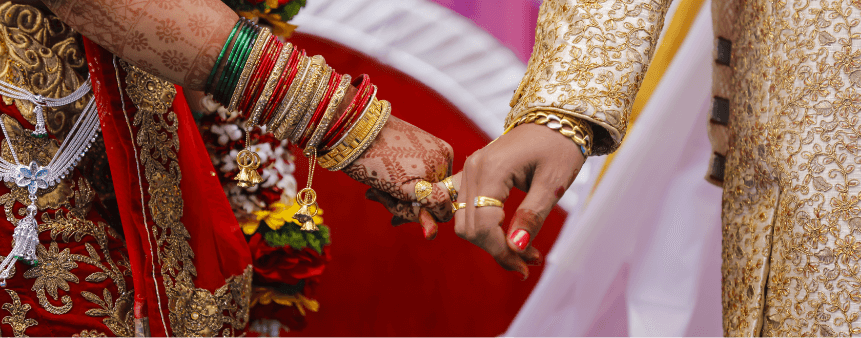Talk to India's best Astrologers
First Consultation at ₹1 only
Login
Enter your mobile number
Whenever we see a married couple start a conversation, there’s this most common question they are presented with; Did you have a love marriage or an arranged marriage. People are often curious to know whether it was their own choice or their parent's decision.
Being arranged in a marriage is a standard norm in India, whereas knowing each other before marriage is beneficial. It's easier to find love in the union, they say.
But there is also a third type of civil marriage, also known as a court marriage.
A marriage ceremony is one of the most memorable moments in one’s life. However, some still like the simplicity of a quiet marriage in a legal office by signing some papers and exchanging flower garlands without so much hassle of a socially elaborated and expensive wedding.
When we talk about marriages in India, it is considered a sacred ceremony where two families become one for a lifetime. Hence, there are a plethora of rituals and ceremonies that go on before and after the wedding day. However, it is observed that many couples prefer civil marriages instead of an extravagant social setup.
Court marriage is very different from traditional marriages.
In India, court marriage or civil marriage does not require ceremonies and rituals to solemnise the wedding. Instead, it requires only the satisfaction of specific rules and regulations of the particular marriage act of 1954.
The couple should apply some of the conditions well in advance to avoid mishaps. Also, the court marriage can only be solemnised between couples above 21 and 18.
The presence of a marriage officer along with three witnesses is a must for legally getting married in court. After the conclusion of the marriage procedure, the married couple is given a marriage certificate stating the legality of their union following the court of law.
Although there is no need to perform any ritual during the civil wedding, many Indian households prefer consulting an astrologer before the wedding to know the right day and time so that the couple can select their marriage slot carefully. Civil marriage is also considered an alternative to religious marriage, where the bride and the groom want to enter their new beginning without extravagance.
To us Indians, marriage is more than just a legal obligation. It is a ritual where not only the bride and groom but their family also tie in a never-ending bond together. When the son or daughter of a family doesn't have a love interest, the family starts finding the right partner for them.
This ritual of arranged marriage has been followed since the Vedic period. In Hinduism, marriage is a sacred relationship between two souls for eternity.
Finalising the perfect match can take several months, sometimes even years. In an arranged marriage, the parents are the sole decision-maker in every aspect of the process.
Once a match is finalised, the elders of a family set up a meeting to decide and figure out the following steps to be taken like the venue, food, and many more such aspects. Several factors determine whether the match is suitable or not, and it may differ from person to person. For example, to some people, social class is considered an important factor along with physical appearance, whereas to some, the happiness of their kids and the satisfaction of welcoming a good soul into the family is sufficient. Horoscope reading is also considered essential, and once the horoscopes have been matched, the match is finalised with no other objection. The more gunas, the better the compatibility between the couples. Also, if it is not as desired, the priest suggests some ways to counter the adverse effects found during the horoscope reading.
Arranged marriage has been in favour for a long time, but it has witnessed some significant evolution with the changing times.
According to Hindu tradition, love marriage is also stated as Gandharv Vivah. Once the boy and the girl decide that they want to get married and spend the rest of their lives with each other, the couple tries to seek blessings and consent from each other's families to go ahead with their decision to love marriage.
With the changing times, families have become more vigilant and accepting of love marriages. They often agree with their child’s wishes and happiness.
The families decide to meet up and exchange gifts to make the relationship formal. They also discuss the further proceedings. After that, they choose the date and time for the auspicious occasion and celebrate their children’s reunion.
